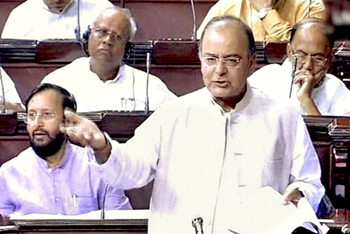New Delhi, Mar 16: Government today countered the Congress charges of snooping on Rahul Gandhi saying it was making a "mountain out of what is not even a molehill" as information collection was part of a transparent security profiling used on 526 VIPs, including Sonia Gandhi and former Prime Ministers.
Responding to charges of snooping and spying on political opponents by Opposition Congress and SP in Rajya Sabha, Leader of the House Arun Jaitley said the police has been collecting such information since 1987 on VIPs operating out of Lutyens Delhi through a profoma form as part of security profiling.
 The proforma, which was revised in 1999, has been used to profile former prime ministers H D Dewa Gowda, I K Gujral, Manmohan Singh and Atal Bihari Vajpayee. The same was also used to profile Congress President Sonia Gandhi in October 2004, 2009, 2010, 2011 and 2012, the Finance Minister said.
The proforma, which was revised in 1999, has been used to profile former prime ministers H D Dewa Gowda, I K Gujral, Manmohan Singh and Atal Bihari Vajpayee. The same was also used to profile Congress President Sonia Gandhi in October 2004, 2009, 2010, 2011 and 2012, the Finance Minister said.
Pranab Mukherjee, before becoming the President, was profiled in 2001, 2007, 2008, 2009 and 2012, while senior BJP leaders L K Advani and Sushma Swaraj, Ahmed Patel of Congress, CPI(M)'s Sitaram Yechury and Sharad Yadav of JD-U were also profiled, he said.
"526 persons have been profiled using the present form," he said, adding this was part of "transparent, security profiling and not associated with any kind of snooping or sypying."
"It is not that it has been started in the last 8 months," he said and proposed to sit with Leader of the Opposition Ghulam Nabi Azad to go through the 526 forms filled during the previous UPA rule.
On the proforma seeking information on shoe size, colour of eyes and other such information, Jaitley said former Prime Minister Rajiv Gandhi was identified by his shoes after his assassination.
Security needs and profiling should be left to security experts and "we should not attempt to become one", he said, adding "the issue raised is making mountain of what is not even a molehill."
Jaitley said the practice of security profiling started in 1987 under Congress rule.





Comments
Add new comment